Driven to Divide: Insights & Perspectives
Exploring the forces and ideas that shape our divided world.
Cardio: Your Heart’s Favorite Workout Party
Join the ultimate cardio party and discover how heart-pumping workouts can boost your mood, fitness, and overall health! Get started today!
Top 5 Cardio Workouts for a Healthy Heart
Cardiovascular health is crucial for overall well-being, and incorporating effective workouts into your routine can significantly enhance your heart health. Here are the top 5 cardio workouts that not only boost your stamina but also strengthen your heart:
- Running: This classic workout can be done outdoors or on a treadmill. Aim for 30 minutes of moderate to intense running to elevate your heart rate.
- Cycling: Whether on a stationary bike or cycling outdoors, this low-impact exercise is excellent for burning calories while promoting heart health.
- Swimming: Engaging multiple muscle groups, swimming is a fantastic full-body workout that’s easy on the joints yet highly effective for cardiovascular fitness.
- HIIT (High-Intensity Interval Training): This involves alternating between intense bursts of activity and brief rest periods, providing an efficient and challenging workout for your heart.
- Jump Rope: A simple yet powerful exercise that can be done almost anywhere. Just 15–20 minutes of jump rope can give your heart a serious workout.

How Often Should You Include Cardio in Your Fitness Routine?
When it comes to incorporating cardio into your fitness routine, frequency is key. Most health experts recommend including cardio exercises at least 150 minutes per week for overall health benefits. This can be broken down into 30 minutes of moderate-intensity cardio, such as brisk walking or cycling, five days a week. For those looking to achieve specific fitness goals, such as weight loss or increased endurance, you may want to increase the duration and intensity of your cardio sessions.
It's also important to listen to your body and adjust your cardio routine accordingly. For beginners, starting with two to three days of low-intensity cardio can help build stamina without overwhelming your system. On the other hand, seasoned athletes might include cardio up to six days a week, alternating between high-intensity interval training and steady-state cardio. Ultimately, finding the right balance that suits your individual needs and complements your strength training will yield the best results.
Exploring the Benefits of High-Intensity Interval Training (HIIT) for Cardiovascular Health
High-Intensity Interval Training (HIIT) has gained immense popularity in recent years, and for good reason. This innovative workout method alternates between short bursts of intense activity and periods of rest or low-intensity exercise. Research indicates that HIIT can significantly improve cardiovascular health by enhancing heart function and increasing aerobic capacity. By engaging in HIIT, individuals can experience improved heart efficiency, reduced resting heart rate, and better blood circulation, all of which contribute to a lower risk of heart disease.
One of the standout benefits of High-Intensity Interval Training is its efficiency. Many people lead busy lives and struggle to find time for extended workouts. HIIT workouts, often lasting 15 to 30 minutes, allow individuals to achieve maximum results in minimal time. This time-efficient approach not only promotes cardiovascular health but also increases metabolism and facilitates fat loss. Incorporating HIIT into your fitness routine can be an effective strategy for those looking to improve their heart health and overall fitness while managing a hectic schedule.